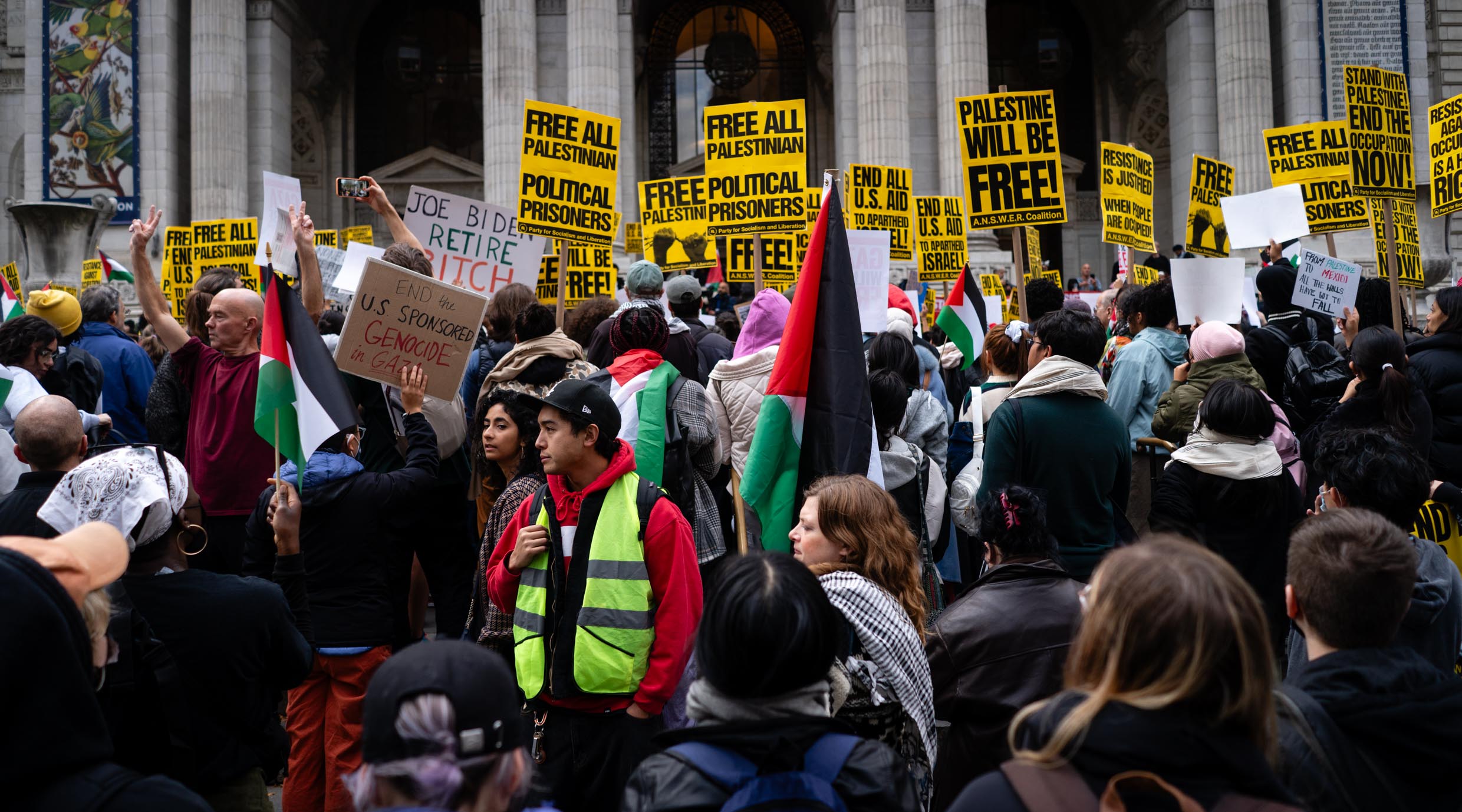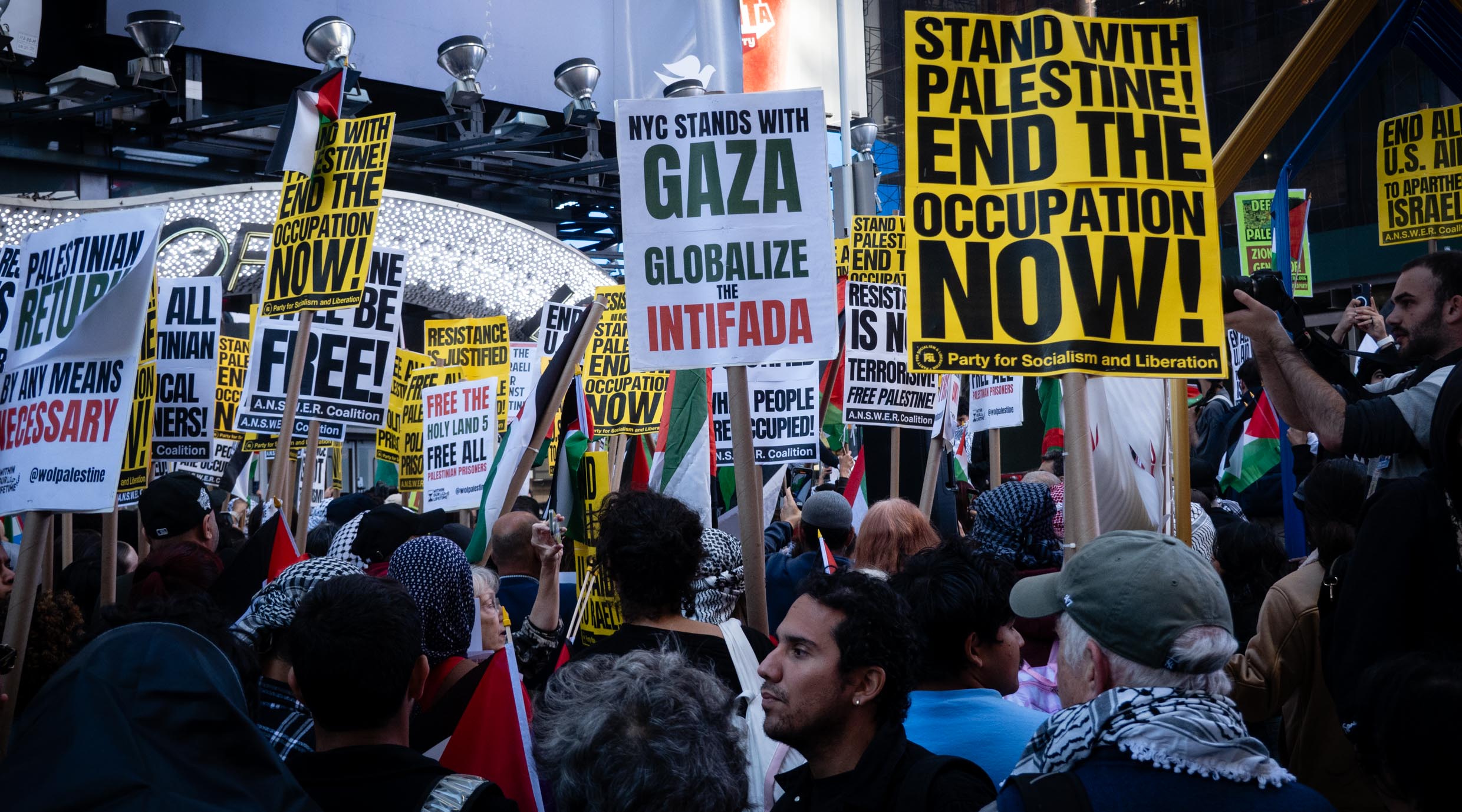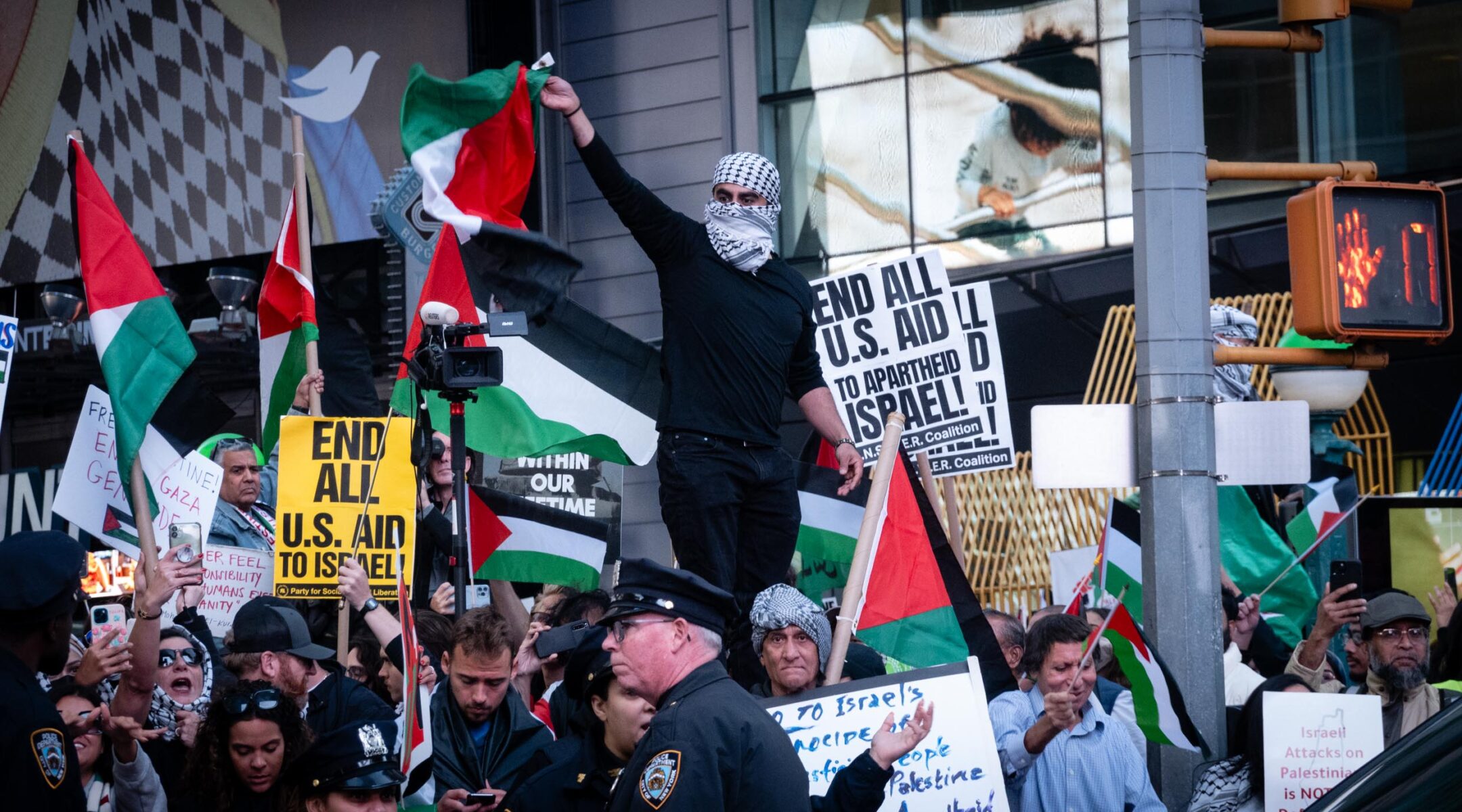(New York Jewish Week) — When a planned rally seeking to “globalize the intifada” descends on Columbia University on Friday, it will be because a group called Within Our Lifetime brought its supporters to the campus to protest against the school’s suspension of pro-Palestinian groups.
The group has become known in recent months for its frequent marches and disruptive protests endorsing Hamas’ Oct. 7 invasion of Israel and for its calls to eliminate Israel. It was co-founded by a former leader of Students for Justice in Palestine, which is currently suspended at Columbia and whose national organization praised the Oct. 7 invasion as a “historic win.”
In the months following Oct. 7, both groups have become among the most visible public opponents of Israel in New York City and beyond. But despite their prominence, their finances and internal operations are hard to track. That’s because both route all of their donations through a small, low-profile nonprofit in Westchester chaired by Howard Horowitz, a left-wing Jewish activist who came to his current anti-Zionist views partly through his time living in Israel decades ago.
Horowitz told the New York Jewish Week that Israel “has displaced, dispossessed and dehumanized — and is now annihilating — those who would be embraced as equals according to the Jewish values I believe in and value.”
And while he condemned the Oct. 7 attack, Horowitz added that his horror was soon replaced by anger at Israel’s response, which he called genocidal.
“October 7 was horrible and emotionally devastating,” he wrote in a lengthy email responding to questions. “Even as I am horrified by the atrocities committed by Hamas, I believe it is important to understand why these Palestinian fighters broke out from the ghetto wall. My outrage at Hamas’s atrocities quickly gave way to my outrage as Israel announced and began the ongoing implementation of genocide.”
Horowitz, a market researcher by profession, is the board chair of the Westchester People’s Action Coalition Foundation, known as Wespac. Founded in 1974, Wespac’s guiding principle, he said, is “nonviolent protests against injustice, discrimination, war and the causes of climate change.”
The group also quietly serves as the financial linchpin for Within Our Lifetime, National SJP and other pro-Palestinian groups by acting as their fiscal sponsor — an arrangement in which a nonprofit collects donations on behalf of other groups that do not have nonprofit status themselves. Wespac’s revenue has more than doubled since 2019.
For the pro-Palestinian groups, the fiscal sponsorship means they can receive tax-deductible donations and grants. It also means they don’t need to file the tax documents expected of nonprofits, such as laying out their operating budget, total assets and spending. Likewise, the arrangement doesn’t require the fiscal sponsor to detail the organizations it collects funding for.
Wespac does not make its fiscal sponsorships public. For National SJP and Within Our Lifetime, the only sign of the relationship is a line of text at the bottom of an online donation page or a notice of Wespac’s office address on the donation receipt. The groups did not respond to requests for comment.
Horowitz wrote to the New York Jewish Week that the fiscal sponsorship accords with Wespac’s goal of supporting “those who would otherwise be unrecognized victims of war, injustice and environmental degradation.” He said the groups’ “peace and justice mission is aligned with ours,” and that their “principles of nonviolence align with ours.”
Wespac’s office is in White Plains and the group’s roots are in the anti-Vietnam War and civil rights movements, said Horowitz, who got involved in the 1970s, following stints living in Jerusalem and on a kibbutz. The time living among secular Israelis was a departure for Horowitz, who grew up in an Orthodox family from New York, and it led to another shift in his views: he became disillusioned with Israel, which was undergoing a rightward shift at the time, and in particular with its policies toward the Palestinians.

Pro-Palestinian demonstrators at a rally near Bryant Park, November 9, 2023. (Luke Tress)
“My Zionist beliefs were shattered by the historical facts,” he wrote in his email. He explained that his opposition to Israel stretches back to its founding, following a United Nations vote that recommended partitioning the land into separate Jewish and Palestinian states.
“The partition plan robbed the Palestinian population of their homes, livelihoods, and land,” he wrote. Using the term, meaning “catastrophe,” that Palestinians use to refer to Israel’s creation, he added, “This was the Nakba.”
Horowitz’s pro-Palestinian stance is echoed by Wespac’s executive director and sole employee, Nada Khader, who has Palestinian roots and relatives in the West Bank and Israel, according to the local publication Lohud. Wespac has long campaigned in support of the Palestinians and the anti-Israel Boycott, Divestment and Sanctions campaign, known as BDS.
Khader condemned the Oct. 7 attack and, in an Oct. 10 statement, decried “crimes against humanity” by both Hamas and Israel. She accused Israel of “indiscriminate and deliberate bombing of civilians,” a charge Israel strenuously denies. The statement also said, “The attack from Gaza has a context.”
“We do not condone attacks on civilians or violence of any kind. We do recognize its root causes in oppression, injustice and apartheid,” Khader wrote.
One of the main avenues by which Wespac aids pro-Palestinian activism is through its fiscal sponsorships. The Anti-Defamation League said in a 2022 report that Wespac sponsored a total of 15 groups related to the Israeli-Palestinian conflict, far more than for any other cause. It is unclear how many groups it sponsors in total.
Among the other groups are the US Palestinian Community Network, the International Jewish Anti-Zionist Network, the Palestinian Feminist Collective, the Palestine Freedom Project, and Adalah-NY, which all collect donations through Wespac online. Wespac has sponsored National SJP since at least 2019 and Within Our Lifetime since 2020, according to archived web pages.
“While WESPAC is not an exclusively anti-Israel organization, the significant number of groups and projects it fiscally sponsors, which have repeatedly propagated antisemitism or called for violence against Israel, is deeply troubling,” the ADL report says. “WESPAC’s administrative support of these groups helps ensure that inflammatory and at times antisemitic language remains an issue in a notable segment of left-wing spaces.”
That administrative support, however, is not apparent from Wespac’s website or tax documents, which give no indication that it accepts and disburses donations for a broad range of the pro-Palestinian activist sphere. Wespac had revenue of $1.07 million in 2021 — the most recent year for which financial information is publicly available — including $750,000 in contributions and grants. It also had assets amounting to $1.05 million.
That revenue includes the money Wespac takes in through its fiscal sponsorships, said Doug White, a philanthropic adviser and author who has written five books on nonprofits. Fiscal sponsorship leaves “a lot of gray area” legally, he said, since the organizations involved are not required to detail their relationships and transactions.
“There’s really no statutory way to track the money that ends up in those Palestinian groups’ hands,” White said. “As a result, you’re left with best practices,” which he said recommend that fiscal sponsors be transparent about their activities.
For Wespac, he said, that kind of transparency would be especially warranted now, while the world’s attention is on the Israel-Hamas war and the pro-Palestinian groups are receiving increased exposure.

Pro-Palestinian protesters at a rally in Times Square, Oct. 13, 2023. (Luke Tress)
“Let’s say I were the head of Wespac and I’m funding a Palestinian group, or maybe more than one, I would be clear about that and I would be clear about why,” White said. “If you don’t have time to put it onto an annual report or anything, put it on the website, saying, ‘Look, we understand that this is a big, hot topic right now. We want you to understand what we’re doing and why.”
Joshua Avedon, the CEO of Jumpstart Labs, a Jewish nonprofit that acts as a fiscal sponsor, also said that according to widely-accepted best practice guidelines, fiscal sponsors and the groups that are sponsored should make the arrangements public.
“There really are no strict rules about what must or must not be done by a fiscal sponsor, which makes it a little bit of a Wild West. There are best practices,” Avedon said, adding that “lack of transparency is a red flag.”
If a group requests funds without making it explicit that they do not have nonprofit status, “or if there’s a group that’s acting as a sponsor but is unwilling to say who they’re a sponsor for, those are both signs that they are not operating within the best practices of the industry,” he said.
The donation pages for National Students for Justice in Palestine and the Palestinian Youth Movement say that contributions to the groups go through the Wespac Foundation. Within Our Lifetime’s donation page said it was fiscally sponsored by Wespac until May 2022, according to an archived web page; a recent small donation to the group was routed through Wespac’s office address. Within Our Lifetime currently makes no mention of Wespac on its donation page or website.
According to tax documents, Wespac’s revenue has shot up since 2019, a year in which it took in a little more than $400,000. Its most recent tax filing also says it spent more than $600,000 on office expenses, the majority of its costs, and far more than the rent for other units in its office building. Arthur Allen, an expert in nonprofit accounting, said that might be a case of inappropriately combining expenses, which is common practice for nonprofits, even though it’s against IRS guidelines.
Recent donors to Wespac include the Elias Foundation, a progressive advocacy group that has also funded Jewish Voice for Peace; the environmental group Grassroots International; and the Virginia-based philanthropy group the Kiblawi Foundation. The Sparkplug Foundation, a New York nonprofit, reported that it had donated $20,000 to “National Students for Justice” through Wespac in 2022, and California’s Bafrayung Fund contributed $20,000 that year to the Palestinian Youth Movement via Wespac. Several donor advised funds have also contributed to Wespac recently.
Neither Horowitz nor Khader responded to follow-up questions about Wespac’s fiscal sponsorships.
The group has ties to other progressive organizations and politicians. Rep. Jamaal Bowman, who represents the area, featured Khader at his campaign kickoff rally last week, alongside Rep. Alexandria Ocasio-Cortez.
The group is not Horowitz’s only volunteer pursuit. He is also a member of the local chapter of the anti-Zionist Jewish Voice for Peace. And he is active with at least two local Jewish institutions that are supportive of Israel: Temple Israel of New Rochelle, a Reform congregation that recently held an event titled “Donate Challah to the IDF,” and the Westchester Jewish Coalition for Immigration, which has supported displaced Israelis and Hamas hostages since Oct. 7.
He has for years called on mainstream Jewish institutions to abandon their backing of Israel — writing as far back as 2018 that Israel was committing genocide.
“Where are our rabbis to call out against this violence perpetrated by Israel? They are few and far between. Instead, the vast majority repeat the ‘I stand with Israel’ declarations, disregarding the horrific facts on the ground,” he wrote in his email. “This is the liquidation of the ghetto called Gaza, a complete atrocity. There is no other way to look at what is happening at this very moment.”
He added, “It is time to do ‘T’shuva,’ repentance. Indeed, I believe the future of the Jewish people depends on justice for Palestine. Truth and reconciliation are the only way forward.”
The New York Jewish Week brings you the stories behind the headlines, keeping you connected to Jewish life in New York. Help sustain the reporting you trust by donating today.





